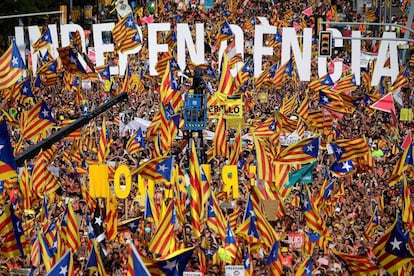New survey shows more Catalans reject independence movement than support it
A poll by the regional Opinion Studies Center has found that 48.6% of respondents in Catalonia are against the separatist drive, up four points from March

Rejection of the Catalan independence movement has risen by 4.5 points in the northeastern Spanish region in the last two months, according to an opinion poll published on Friday by the regional government’s Opinion Studies Center (CEO), a body tasked with carrying out political research in Catalonia. A total of 48.6% of respondents to the CEO’s latest survey responded negatively to the idea of secession from Spain, compared to 44.1% in March.
The percentage of people who responded “yes” to the question “Do you want Catalonia to become an independent state?” came in at 47.2%, down from the last survey by the CEO when the figure was 48.4%.
With regard to the future of Catalonia, 35% of respondents said they were in favor of the region becoming an independent state
The percentage of citizens in the region who are opposed to independence has not exceeded those who are in favor since June 2017. That was when tensions were running high ahead of plans for a referendum on independence in the region. That vote went ahead on October 1 of that year, after having been declared illegal by Spain’s top courts.
The events of that day made headlines the world over due to police violence against citizens trying to vote. A unilateral declaration of independence was subsequently passed by the regional government, prompting Madrid to suspend the region’s powers and sack the Catalan government.
Since then, pro-independence leaders have been put on trial in the Supreme Court for their role in the events of the fall of 2017, a court case that is ongoing. Several politicians, such as former regional premier Carles Puigdemont, fled Spain to avoid arrest and remain in self-imposed exile.
In terms of the personal feelings of those surveyed by CEO, 40.4% say that they feel as Spanish as they do Catalan, 26.1% only Catalan, 21.4% more Catalan than Spanish, 5.1% only Spanish and 3.1% more Spanish than Catalan.

The CEO poll found that 49.3% think it unlikely that the central government in Madrid will offer Catalonia an agreement on independence that will be accepted by a majority in the regional parliament, 27.4% not at all likely, 13.9% quite likely and 5.9% very likely.
With regard to the future way that Catalonia fits within Spain, 35% of respondents said they were in favor of the region becoming an independent state, 29.4% opt for a state within a federal Spain, 25.8% want it to continue to be an autonomous region within the country, and 6% want it to be a Spanish region.
European elections
The survey also reveals that the Catalan Republican Left (ERC) party would win the European elections in the region, with 22.5% of the vote, followed by the Catalan branch of the Socialist Party (PSC) with 22.2%, and then Together for Catalonia (JxCat) with 21.2%.
The conservative Popular Party (PP), which has taken an extremely hard line against the Catalan separatist movement, is forecast by the poll to pick up just 4.2% of the vote, with far-right party Vox predicted to take 3.2%.
The poll was carried out after the April 28 general election in Spain, and was based on a telephone interview with a thousand people between April 30 and May 6.
The survey reveals that the Catalan Republican Left party would win the European elections in the region, with 22.5% of the vote
The director of CEO, Jordi Argelaguet, warned, however, that more than 32% of respondents were undecided on their voting intentions, and a significant percentage of those polled did not respond to the question (7.4%), meaning that the results are “wide open.”
The CEO poll also analyzes the results of the general election, which was won by the Socialist Party but without a clear majority, meaning cross-party deals will be needed to form a government. The CEO survey found that 60.2% of respondents prefer a coalition government between the PSOE and left-wing bloc Unidas Podemos. Nearly 18% of those polled would prefer a PSOE minority government and 13.8% opt for the PSOE to join forces with center-right Citizens (Ciudadanos).
English version by Simon Hunter.
Tu suscripción se está usando en otro dispositivo
¿Quieres añadir otro usuario a tu suscripción?
Si continúas leyendo en este dispositivo, no se podrá leer en el otro.
FlechaTu suscripción se está usando en otro dispositivo y solo puedes acceder a EL PAÍS desde un dispositivo a la vez.
Si quieres compartir tu cuenta, cambia tu suscripción a la modalidad Premium, así podrás añadir otro usuario. Cada uno accederá con su propia cuenta de email, lo que os permitirá personalizar vuestra experiencia en EL PAÍS.
¿Tienes una suscripción de empresa? Accede aquí para contratar más cuentas.
En el caso de no saber quién está usando tu cuenta, te recomendamos cambiar tu contraseña aquí.
Si decides continuar compartiendo tu cuenta, este mensaje se mostrará en tu dispositivo y en el de la otra persona que está usando tu cuenta de forma indefinida, afectando a tu experiencia de lectura. Puedes consultar aquí los términos y condiciones de la suscripción digital.








































